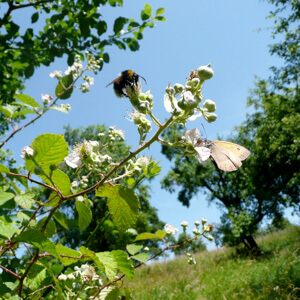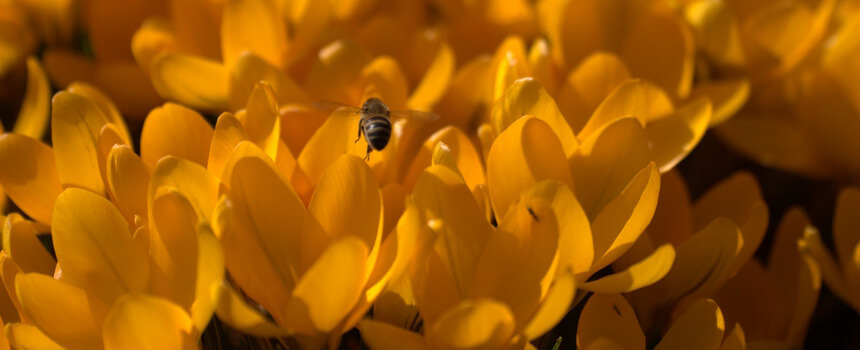 Fight against the dying of bees
Fight against the dying of bees
New bee hives for the Hessian meadow orchards
The apple is said to be the Germans’ favourite fruit. Supermarkets sadly offer fewer and fewer apple varieties to buy. On the other hand, orchards are home to a huge selection of fantastic apple varieties. Many of these varieties are more digestible for allergy sufferers and much healthier than the typical varieties from the supermarket. Orchard meadows are also a place of special biodiversity. The little owl, rare butterflies and many bee colonies find a safe home here. Bees are indispensable for the preservation of the colourful diversity and their humming sweetens every beautiful spring day. The protection of orchard meadows is therefore of central importance for bees in Germany.
Necessity
Creation of natural spaces as a habitat for bees in Germany.
Activity
Naturefund sets up beehives near meadow orchards.
Countable effort
Number of bees that are given a new home in meadow orchards.
Result
Many many bees find a home in the orchards and contribute to the preservation of biodiversity.
Systemic effect
The meadow orchards are a place of biodiversity. They provide a home for many old fruit varieties as well as endangered insect species.
Background
Albert Einstein is believed to have once said: “Once the bee disappears from the earth, man has only four years left to live”. Long-term studies already show dramatic decreases of up to 75 percent in the number of insects. Many environmental toxins and ever smaller areas of retreat for these creatures are to blame for the decrease in the insect populations (Hallmann, 2017 and Sorg, 2013). Especially in Germany, large monocultures are prevalent. Such agricultural use shapes our landscape. Natural meadows are becoming a rarity today. For bees, butterflies and bumble bees these natural meadows are very important. Colourful flowers, grasses and blossoming trees immediately provide the basis for their nutrition. Only when different plants bloom at different times, animals are able to find enough food. In the orchards, bees find exactly this variety and can flourish.
The good deed
In order to promote the bee and insect prosperity in the orchards, Naturefund has set up beehives for wild bees in these protected orchards. The good deed directly supports the new bee colonies and allows them to find a new home. In addition, old fruit trees are cultivated in the orchards, mistletoe is removed and young fruit trees of old varieties are planted. The work is supported by volunteers who take care of the fruit trees. The hard work of the busy bees in the orchards is thus of great benefit to both the biodiversity and the people.

AboutGermany
Berlin
82 521 653
46.136
5
The favourite fruit in Germany is the apple. No other EU country consumes as many per year: 25 kilos per capita.
About the organization and further information
Naturefund e.V.
Website
Further information and source
- NABU Artikel, 2017. Wissenschaftler bestätigen dramatisches Insektensterben.
- BUND, 2018. Lebensraum Streuobstwiese.
- Hallmann C. A. et al, 2017: More than 75 percent decline over 27 years in total flying insect biomass in protected areas. PLoS ONE 12(10). DOI: 10.1371/journal.pone.0185809.
- Sorg, M.; Schwan, H.; Stenmans, W. & A. Muller: Ermittlung der Biomassen flugaktiver Insekten im Naturschutzgebiet Orbroicher Bruch mit Malaise Fallen in den Jahren 1989 und 2013. In: Mitteilungen aus dem Entomologischen Verein Krefeld Vol. 1 (2013), pp. 1-5.
- NABU Artikel, 2017. Wissenschaftler bestätigen dramatisches Insektensterben.
- BUND, 2018. Lebensraum Streuobstwiese.
- Hallmann C. A. et al, 2017: More than 75 percent decline over 27 years in total flying insect biomass in protected areas. PLoS ONE 12(10). DOI: 10.1371/journal.pone.0185809.
- Sorg, M.; Schwan, H.; Stenmans, W. & A. Muller: Ermittlung der Biomassen flugaktiver Insekten im Naturschutzgebiet Orbroicher Bruch mit Malaise Fallen in den Jahren 1989 und 2013. In: Mitteilungen aus dem Entomologischen Verein Krefeld Vol. 1 (2013), pp. 1-5.




